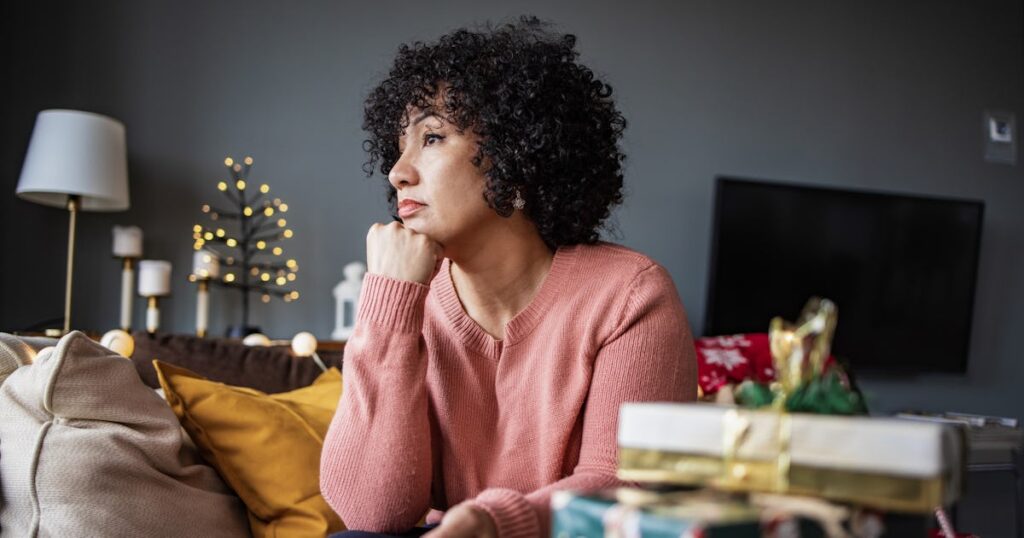[ad_1]
For many people, the cliche holds up: The holidays are the most wonderful time of the year. But for a lot of us, the opposite is true — and our struggle with this season is often rooted in a fractured relationship somewhere in our family tree.
As a veteran social worker, I’ve seen it time and again. I’ve counseled people through grief, loss reunification, and estranged relationships. But I speak from personal experience, too — my connection with my father has become so strained that we’ve ultimately had no contact for the last five years.
It’s not that we haven’t tried. We’ve had deep conversations, but I would mostly leave those feeling dismissed or minimized. Many interactions came across as flippant and demeaning. Rarely did I leave time spent with my dad feeling supported. I tried on numerous occasions to explain this to him and express what I needed, but I never felt heard.
His absence in my life always hits especially hard on holidays.
I used to struggle to find the right card for his birthday or Father’s Day. I wanted to give him something that felt authentic, but none of the cards spoke truth to my relationship with him. And so, every year in adulthood, those special calendar dates are punctuated by a nagging thought: Should I call or not call?
I’ve taken many different approaches throughout my life to get close to him and repair the relationship I longed to have with him when I was younger.
Many of those experiences just left me sad or lonely, and expectations remained unmet. I also couldn’t help but be hurt by his general disinterest in my life and the family my husband of 20 years and I have built. He doesn’t know our four children — his grandchildren.
I have to remind myself that he’s struggled with his own demons of trauma and abandonment, making it difficult for him to have a secure attachment with any of his five children. He and my mom divorced almost 30 years ago, and we’re seemingly a reflection of her, a relationship he didn’t want to end.
Still, I decided I needed to protect myself… which meant disengaging completely.
He stopped coming to my house for Thanksgiving. We stopped obligatory birthday calls, and I stopped making efforts to stop by and check on him. Initially, this was extremely difficult. I desperately wanted things to be different. I was angry, bitter, and resentful. How could he not want more from our relationship? Why wasn’t he proud of me?
But I knew I had to work through those feelings, because the only person it was hurting was me. And estranged — or even just strained — relationships are tangled up in all kinds of complex emotions. Just because you don’t agree with the person or want to be around them doesn’t mean you don’t also feel deep gratitude or respect or affection for some version of them.
I chose, then, to take a more gentle approach. I decided to detach from my dad with love.
For me, that means honoring the parts of him I’ve treasured in my life by doing things we used to enjoy doing together. Walks on the Chicago lakefront. Going to our favorite restaurants with my siblings. Traveling.
It means making little gestures that, more than anything, are cathartic for me. I light a candle every holiday and take a few minutes to release positive energy to him, hoping he might be able to feel it. I write him a letter in my journal that I don’t send. When my family gathers for the holidays without him (he stopped accepting the invites to join us), I send a plate of food home with my brother to drop off.
People have asked me if I think I’ll regret taking this approach when my dad dies. I don’t know the answer to that yet.
What I do know is I’ve found a sense of inner peace, not battling in my head and my heart with his intentions, his words, or lack thereof.
I do love him. I always have, and I always will. For better and for worse, we have a lot in common. But Dad has a lot of his own healing to do, and my hope for him this holiday season is that he, too, finds peace.
As for me, I will hold hugs a little longer and tighter. That’s the love language my dad taught me — it made me feel safe — and I hope to radiate that same feeling of safeness to those I’m surrounded by. I’ll appreciate my husband, the father to our children that I wish my dad had been for me. I’ll channel my pain into joy by being the best parent I can be to our kids.
And I’ll sit in gratitude for the people in my life who do show up and accept them for who they are, versus longing for the person who doesn’t.
Kelley Kitley is a licensed clinical social worker and therapist with over 20 years of experience in the field. The mom of four is also a sought-after national mental health media expert and author who has appeared on The Today Show, Dr. Oz, The Drew Barrymore Show, and more. She owns Serendipitous Psychotherapy in Chicago.
[ad_2]
Source link

